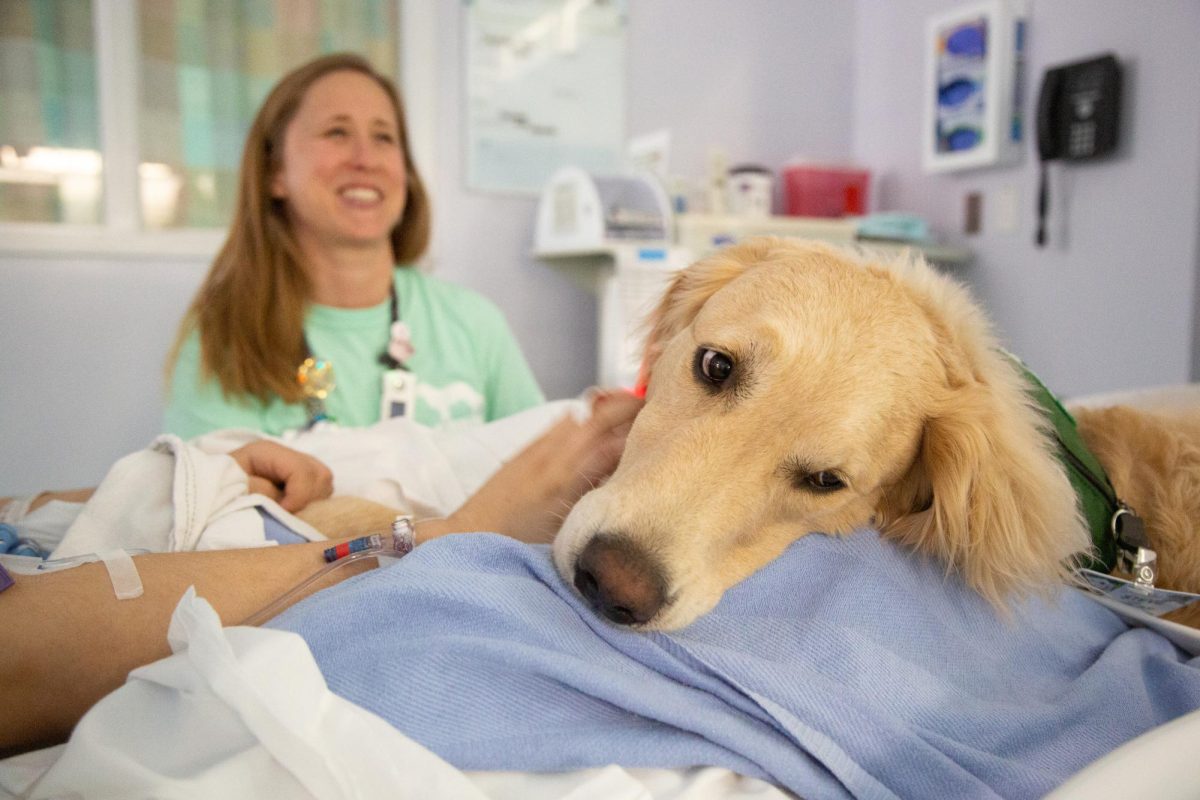On Tuesday at 9 a.m., the transformation of the convergence center in the Moudy South building began.
Boxes of cords. Cameras. Tripods. Lights, laptops and audio equipment filled the room as a team of 10 engineers began the remodel.
The crew had 32 hours to ready the room so Scott Pelley could anchor the “CBS Evening News” live at 5:30 p.m. Wednesday before the 10th annual Schieffer Symposium.
Pelley was one of four panelists in the symposium, along with Watergate reporter Bob Woodward, Wall Street Journal columnist Peggy Noonan, and Jane Pauley, longtime anchor of the Today show.
Bob Schieffer, moderator of the symposium and CBS’ chief Washington correspondent, planned for Pelley to broadcast from TCU because he “wanted to do something special” for the symposium’s 10th anniversary.
Schieffer, a TCU alumnus, said the “Evening News” had 7.8 million viewers last week. If Wednesday’s show were to pull those numbers, it would give TCU it’s largest one-time audience since the 2011 Rose Bowl.
“I called Scott and Pat Schevlin, who is the executive producer, and I said, ‘What can I do to get you guys to come down to TCU?’ And they said, ‘Yeah, we’ll do it,’” Schieffer said.
David Whillock, dean of the Schieffer College of Communication, said Schieffer and CBS did most of the work in terms of getting the “CBS Evening News” on TCU’s campus.
“We did some internal expenditures. We had to update some things that we probably should have updated anyway,” he said. “With something like this, we had big things to consider. Do you have enough cables? Do the cables work? What does it look like on the board when they show it?”
Ultimately, Whillock said, “Schieffer wanted Pelley to be here.”
Pelley became the anchor and managing editor of the “CBS Evening News” in 2011, according to CBS News’ website, and in the 2012-13 season, the broadcast finished with one of its highest rated seasons over the past 18 years.
As of April 8, 2014, “CBS Evening News” is up 7 percent in viewers as compared to the same week last year, according to Nielsen ratings. It was also reported that the broadcast has posted year-to-year increases in viewers since Pelley took over as anchor.
“Scott and Schevlin love to take the broadcast where news is happening, and I’m clearly biased on this one, but I can’t think of a more exciting place to anchor the news than the TCU campus,” Schieffer said.
Live television rarely goes smoothly, though.
The crew planned to start building the set at 9 a.m. Tuesday, but the stage platform, which had oversized 12-inch beams, was too large to fit in the elevator or the stairwell.
They waited an hour for a smaller stage to be delivered.
Following that, windows were covered with black fabric as the team had to decide where Pelley would sit and where cameras would be locked in place.
Electrical cords and telephone wires coiled and snaked the floor. Hammers pounded and a generator hummed in the background.
“This is the business, it’s not all glamour on the road,” an engineer said about the construction. “Things need to be fixed.”
By noon, the space took shape. The stark fluorescent lights of the convergence center were shut off as the darkened room was punctuated with the glow of red, blue and orange stage lights.
At 4 p.m., the crew in New York, where the “Evening News” is normally broadcasted from, gave the crew a thumbs up that the shot was ready for Wednesday’s show.
The next morning, finishing touches started at 8 a.m.
Producers and stage managers planned at a large desk. Pelley arrived around noon, ready for his first task of the day: going live at 2 p.m. outside of Moudy South for coverage of the Fort Hood shooting memorial.
He spoke about the shooting on April 2, in which Spc. Ivan Lopez killed three soldiers and wounded 16 others before shooting himself. The script was covered by video clips until President Barack Obama addressed soldiers and their families in Fort Hood.
At 3 p.m., he sat in his chair on set and voiced a package for “60 Minutes.” Holding just a microphone, he read six pages of a text story about Pope Francis that would be edited with video.
“These ‘60 Minutes’ packages are long! A few more pages, hang in there,” Pelley said to quiet students after reading three pages of his script. “Thank you all for being patient.”
At 5 p.m., he interviewed with CBS 11 reporter and news anchor Tracey Kornet. Pelley answered questions about broadcasting from TCU and what he appreciates most about Schieffer.
Pelley, who attended Texas Tech University, said, “It’s great to be home.”
And then, after a large crew spent hours adjusting lights, camera angles, teleprompter scripts and audio levels, Pelley went live at 5:30 p.m.
“Good evening, we’re coming to you from the Bob Schieffer College of Communication, preparing the next generation of journalists on the campus of Texas Christian University,” he said as he opened the show.
He read about a high school stabbing in Murrysville, Pa., a new lead in the search for Malaysia Airlines Flight 370 and updates in the Oscar Pistorius murder trial, among other stories.
Signing off, Pelley said, “Thanks to the Bob Schieffer College of Communication for its hospitality. I’m Scott Pelley in Fort Worth. Goodnight.”
To view the broadcast, watch the video below.





